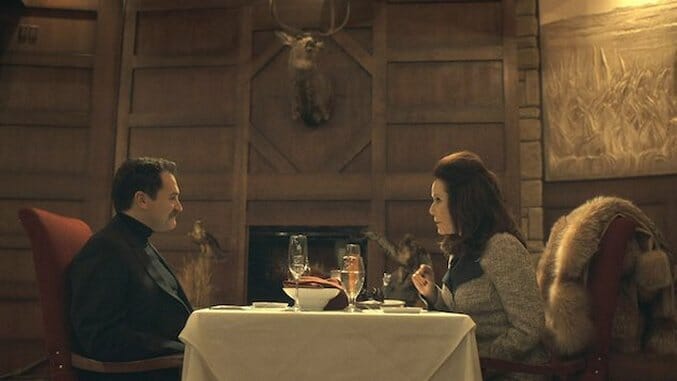If Fargo‘s Murder Mystery Is No Mystery at All, What Keeps Us Watching?
(Episode 3.05)
FX
Fargo has a rather flippant relationship with the truth and morality. It’s right there in the opening title that flashes across the screen before the events of every episode, letting us know that this is based on a true story, but that some facts might not be portrayed exactly as they were. On top of that, creator Noah Hawley has publicly stated that the pre-episode warning allows the show to go to almost any place imaginable—hence the UFOs of Season Two fitting in so snugly with the more traditional procedural elements. It’s not just the plot that treats the truth similarly to the way Donald Trump does; it’s the characters that populate Season Three as well. Most of them, excluding perhaps Gloria Burgle (Carrie Coon) and Winnie Lopez (Olivia Sandoval), see the truth not as a stable thing that deals with facts and reality, but rather a shifting representation of reality that can be shaped to fit just about any need or motivation.
So far, this season of Fargo is playing with the idea of truth in ways that are both intriguing and frustrating. Consider, for a second, the truth we understand as viewers. Just like the two previous seasons, we’re already privy to all the information about the two murders driving the plot. We already know that Maurice (Scoot McNairy) killed Ennis (Scott Hylands), and that he was supposed to rob Emmit (Ewan McGregor). We already know that Nikki (Mary Elizabeth Winstead) pushed an air conditioner onto Maurice and killed him in order to cover up the fact that she and Ray (Ewan McGregor) hired him to rob Emmit. There’s no mystery here. This isn’t a traditional whodunit, where we get to watch and uncover the truth one piece at a time along with our intrepid, upstanding cops. Instead, we already know who’s responsible. So, where does the dramatic tension come from, and what is Fargo asking us to be invested in when it comes to plot and character progression? In other words, if the murder mystery is no mystery at all, what keeps us watching?
At the top of the episode, the words to Mac Davis’ “Oh Lord It’s Hard to Be Humble” ring out. “Oh Lord it’s hard to be humble, when you’re perfect in every way,” goes the refrain as Emmit Stussy drives around town and his property. It’s a cutting musical barb, a way to underline how Emmit uses his Midwestern charm to deflect his more sinister—though nowhere near V.M. Varga (David Thewlis) levels of sinister—motivations. He’s a man with a blood feud as old as he is, and a deal with organized crime on his hands that he refuses to take any responsibility for. Emmit isn’t alone in this kind of self-righteous behavior, where taking responsibility for one’s shady actions is a rare custom and everyone else is the bad guy. Ray and Nikki are the same, dropping a “sex tape” on Ray’s doorstep in order to blackmail him into giving them $100,000 and the last rare stamp, only for Stella (Linda Kash) to see the tape first and leave Emmit all by his lonesome.
-

-

-

-

-

-

-

-

-

-

-

-

-

-

-

-

-

-

-

-

-

-

-

-

-

-

-

-

-

-

-

-

-

-

-

-

-

-

-

-








































